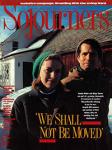The dancers whirled in a sea of color as the sound of many drums filled the air and made our hearts pound. Flags, banners, and streamers rushed throughout the Olympic gymnasium, surrounding us with a rainbow of movement and cadence. It was "Korean night" at the Justice, Peace, and The Integrity of Creation World Convocation in Seoul, Korea, sponsored by the World Council of Churches.
"JPIC," as the new program is often referred to, began at the WCC Assembly in Vancouver, British Columbia in 1983. The attempt has been to integrate biblically the most pressing questions facing the world. Underlying the JPIC process, now occurring on every continent, is the fundamental conviction that the various crises confronting us are all deeply related and must be resolved together.
The Seoul Convocation was significant not only for its breadth of participation, but also for the way it brought together the concerns of churches worldwide. The urgency of justice, the longing for peace, and the cry of creation are no longer fragmented agendas, but rather have become the unified and common struggle of our many faith communities.
At the Olympic Park, built for the 1988 summer games, 1,000 delegates, advisers, staff, and media representatives from most of the countries of the world gathered for a week's deliberations. A rich experience of worship filled our mornings, with testimonies reflecting the meaning of the gospel in myriad contexts and circumstances, which both energized and undergirded the days' activities. The gathered assembly heard the stories of young women forced into prostitution in the Philippines and young people in East Germany taking their first breath of freedom, of "untouchables" in India and aboriginals in Australia seeking dignity and self-determination, of black youth in the townships of South Africa fighting for a new nation and in the inner-city of Washington, D.C., fighting for their lives.
Frank Chikane, general secretary of the South African Council of Churches, offered the keynote address. Chikane said, "Our problem is that we have divided the world into the poor and the rich, black and white, male and female, East and West, South and North. We thought we could accumulate wealth at the expense of others; that we could secure our freedom at the expense of the freedom of others; that we could ensure our security at the expense of the security of others; that we could win wars and dispossess others and enjoy our unjust victories in peace; that we could survive merely because we were powerful and wealthy.
"But ... this situation is untenable. Reality has made us rediscover one another as sisters and brothers irrespective of race, class, color, or creed; as God's people. We are being forced to rediscover our common destiny, common interests, and the common good, which now all supercedes individualistic, egoistic interests which predestine our damned future together. Now it is not just a matter of morality to concern ourselves about one another, but it is now a matter of the reality of how God wanted us to live together in a covenant of mutual commitment to one another and to the whole creation."
AFTER WORKING ON A DOCUMENT and a series of theological affirmations, the act of covenanting together became the most important work of this convocation. Three covenants had been prepared in response to the international economy and the debt crisis, the environment, and world militarization. Through the leadership of the African-American delegation from the United States, all the black delegates from around the world put forward a fourth covenant on racism that was overwhelmingly affirmed by the entire assembly. Members of the American delegation were instrumental in putting the fundamental issues of racial and economic justice before this convocation. One black woman from the United States happily told me she was never more proud of her own country's contribution to such a gathering.
As always, much networking, strategizing, and relationship-building took place around the edges of the more formal proceedings. Near the end of the week, a number of other covenants between delegates and regions were announced to the enthusiastic applause of the whole assembly: Israelis and Palestinians covenanted together for peace in the Middle East. Northern nations covenanted together to reduce "greenhouse gases" and protect the Earth's ozone layer. Delegations from the Philippines and El Salvador covenanted together for mutual support in each other's struggles for liberation. Delegations from Western and Eastern Europe covenanted with Koreans for the peaceful reunification of Korea. Youth delegates from all over the world made covenants to act together in the future.
Black, white, and indigenous peoples from North and South America and Europe covenanted to focus together on the 500th anniversary of the colonization of the Americas in 1992. Delegates from the East, West, and South covenanted for a new dialogue on the shape of the political economy in the face of the moral collapse of the two major world systems. Delegates from seven countries covenanted to establish new ministries of peacemaking, including a Global Peace Services. European and Asian delegates covenanted to fight the exploitation of women worldwide, especially the "trafficking" of Filipino women. Covenants were also made between the Pacific and French churches for the sake of Islander peoples, between Caribbean churches on behalf of Haiti, between the Sinhalese and Tamils in Sri Lanka to work together for a just peace, between evangelicals worldwide to promote justice, peace, and the integrity of creation in their constituencies. And there were many more.
The life, energy, and spiritual power of the gathered global church are something to behold. That is the great contribution of the World Council of Churches. At Seoul, the diversity of the church's gifts and the potential of its contribution to the world at this particular moment were both apparent and exciting.
Jim Wallis is editor-in-chief of Sojourners.

Got something to say about what you're reading? We value your feedback!